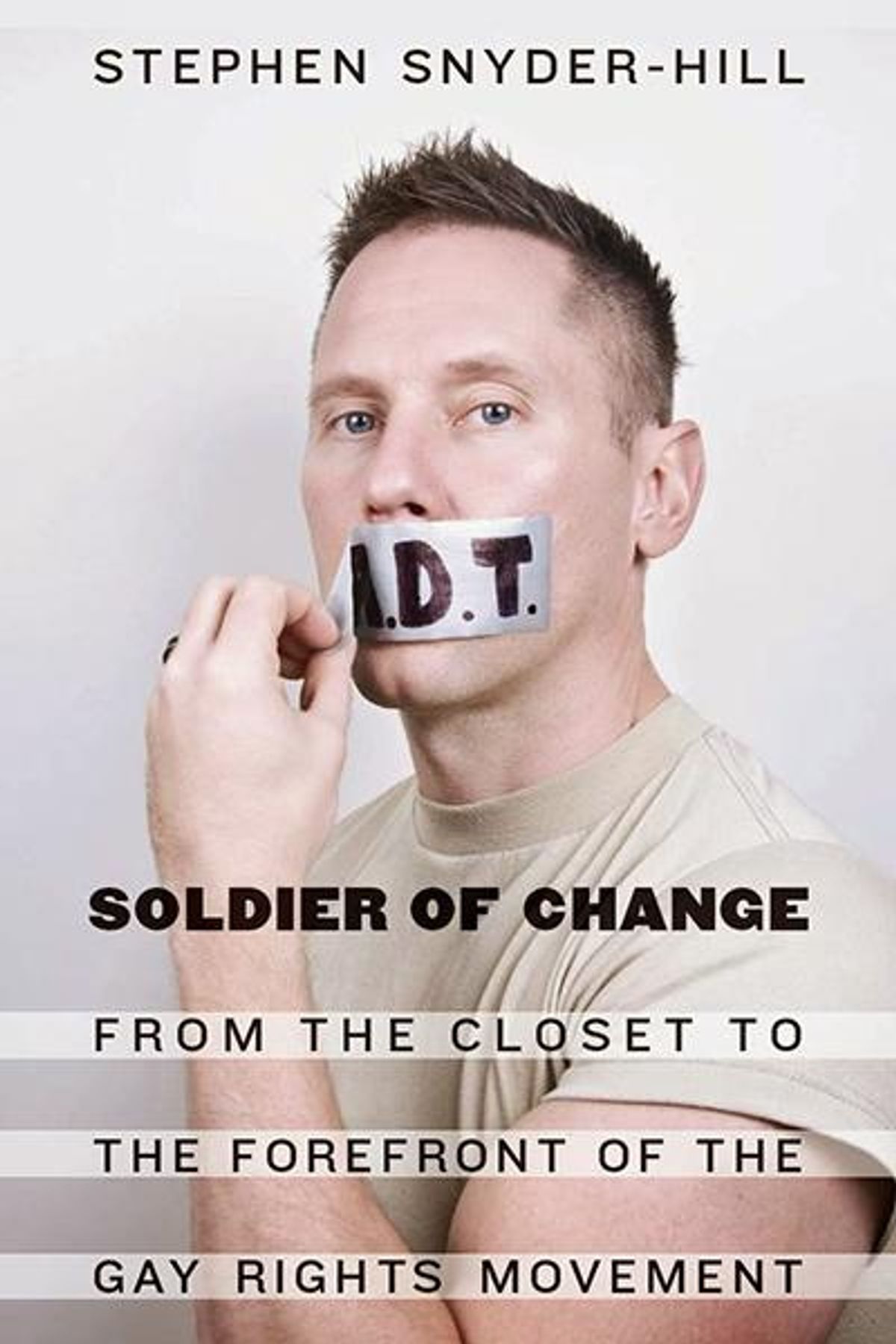
Three years ago, he was booed at a Republican debate. Now he has a new book about the experience.
November 11 2014 5:00 AM EST
November 17 2015 5:28 AM EST
By continuing to use our site, you agree to our Private Policy and Terms of Use.

It was three years ago last month that Stephen Hill was booed at a Republican presidential debate. The solider had just asked the candidates via YouTube whether they would undo the progress of repealing the "don't ask, don't tell" policy; and before they had time to answer in the affirmative, some in the audience called out derisively.
The incident became a major milestone in the 2011 primary, particularly since none of the candidates reacted with support for the soldier.
Now back from Iraq and married to his husband, Josh, Stephen Snyder-Hill has a new book out, chronicling his life leading up to and following the debate. In Soldier of Change, he tracks his 20-year journey in and out of the closet as military attitudes evolve over the decades.
"I've gone through a lot of my life wanting to be loved and wanting to love someone," he said during his recent book tour. "And never finding the right person that was perfect for me. And it's just fate that the minute I find someone and I know in my heart that he's right, to get that news that I was going to get deployed, it was heart wrenching."
Josh and Stephen met in 2010, introduced by friends who sensed they'd have a rapport. That September, he got the news that he'd be sent to Iraq. And by October, he was overseas.
Stephen worried at first that Josh might not be there when he returned. "Somebody I finally can connect with now is probably not going to wait a year for me to go and come back," he worried.
It was a dark thought that echoed a tumultuous upbringing. Stephen grew up in a conservative part of Ohio, and was plagued by what he simply called "a darkness" that he didn't want to face. For years, he remained closeted and unhappy, but he faced a turning point in a war zone during his first deployment in 1990.
Trapped in a hail of artillery fire, 19-year-old Stephen thought he was about to die. "I honestly felt like this is it," he recalled. "I shrunk down into my vehicle and I thought my life is over right now, and got ready for whatever came next."
He looked up at a photo of his brother and his girlfriend, and suddenly it was clear to him that he'd been living a lie. "I'm going to die today and I've never lived a day of my life for myself," he thought. "I've never let myself love another human being. ... If I live through this moment, I'm going to change my life."
And so he did. He survived the fighting, returned to the states, and started his coming-out process in college.
But when he re-entered the military in 2001, he had to go back into the closet. "I had no idea how hard it was going to be to have to go back into the closet," he said. "Right down to having to peel the [Human Rights Campaign] bumper sticker off my car."
Keeping his life secret took an emotional toll. One night, some soldier friends called to say they were stopping by, and Stephen had to race around the house removing pictures of himself and Josh. Josh quickly learned that they needed to keep their relationship hidden in public, which prevented even the slightest show of affection.
But as the deployment wore on, maintaining that secrecy took its toll. On more than one occasion, Stephen would have to cut off a call with Josh after hearing a nearby explosion. Josh would be left to sit in silence on the other side of the world, wondering if he would even get a call from the military if anything happened to his partner.
When Stephen was home on leave, they knew what they had to do. "I don't want to die and not have married you," Stephen said. They traveled to Washington D.C. to marry at the grave of Leonard Matlovich, a veteran who spoke out for equality long before it was safe to do so.
Stephen returned to Iraq a married man, though he'd need to keep it a secret a little while longer until DADT was repealed. Just a few days after the military ban was lifted, his question appeared during the debate.
The visibility, particularly in light of the hostile response, drew a national spotlight to the way that America treats its gay servicemembers -- and citizens in general. But, Stephen says, "You don't have to be booed on national TV. If you can change one person's mind, if everybody could do that, the world would be a better place. We're all activists in our own right."
Want more breaking equality news & trending entertainment stories?
Check out our NEW 24/7 streaming service: the Advocate Channel!
Download the Advocate Channel App for your mobile phone and your favorite streaming device!